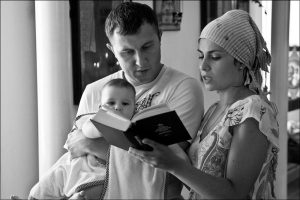In one of the workshops I attended during the Archdiocese Clergy Symposium, the Fr. George Eber said, “Marriage will reveal your sins.”
That sure is true!
I think one of the reasons why marriage is one of the only two paths the Church recommends as lifestyles leading to salvation (the other being monasticism) is because in marriage, it is impossible to hide our weaknesses. (By the way, people who are neither married nor monastics can be saved too. Marriage and monasticism are merely the two paths the Church recommends.)
Although marriage will indeed reveal our sins, there is no guarantee that we will see them. Marriage is a pressure cooker. The normal pressures of life become intensified in the inescapable closeness of marriage and family life (just as it is in monastic life, by the way). All our pettiness, selfishness, and lack of patience is squeezed out into the open when we are tired, off our guard and, inevitably, with the ones we love. But still, it is easy not to see it. It is easy not to see it because along with our own weaknesses, the weaknesses of our spouse and children become manifest too.
Often in confession a man or woman will spend a lot of time telling me what his or her spouse or children do, as though their own sin was just a response–a sinful response to be sure, but if the spouse or children hadn’t [whatever], then they wouldn’t have…. Or so they think. What we fail to realize is that the whole thing is a set up. Marriage is God’s workshop (in my less generous moments, I have called it God’s vice, as in clamp) in which he holds us tight and uses our loved ones as a file cutting away the selfishness around our edges. If we are not careful, instead of benefiting from this opportunity to grow in godliness, we, like Adam and Eve in the beginning, can end up blaming the other. When we blame, we fail to grow.
Of course all of this about marriage being God’s workshop assumes a relatively healthy man and woman. It doesn’t even matter if one is not a Christian. However, if one of the partners is very sick (mentally, emotionally or spiritually), matters become more complicated–but not essentially different. If your spouse is violent or you are constantly in fear, get help now. Fortunately, however, most married people have basic mental health, although they may still be very selfish.
There is a monastic principle that I think has application to married life: “Your cell will teach you to pray.” By staying in marriage and praying for our spouse and children, we learn how to pray. We cannot change others, but God can. And much more important than changing others, God can change us. While marriage reveals sin, it also reveals graciousness. As we pray for our loved ones and focus on our own repentance, married life can become–at least at moments–filled with Grace. And Grace is a little bit of Heaven on earth.




















